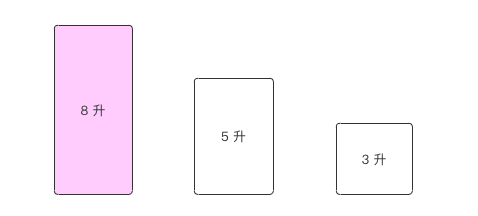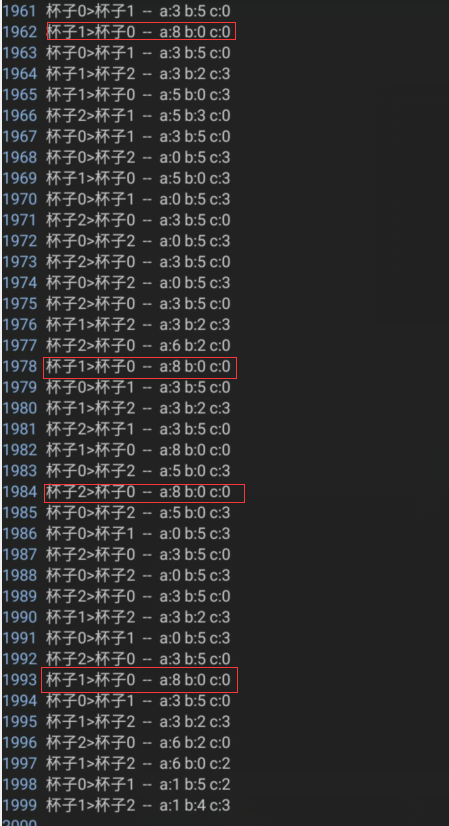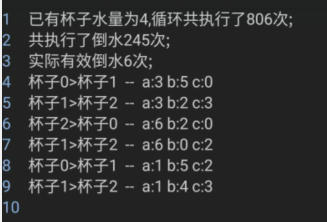用猴子打印《莎士比亚全集》的办法解决字节跳动水壶题
偶然的一次聊天,看到了一道网传的字节跳动面试题,题目是这样的:

原题:给你一个装满水的 8 升满壶和两个分别是 5 升、3 升的空壶,请想个优雅的办法,使得其中一个水壶恰好装 4 升水,每一步的操作只能是倒空或倒满。
也不知道哪来的自信,:),鼓捣了起来。首先想找一下突破点,看了许久… 。一点思路都没有,除了想到这几点:
容量是4所以最后不会是三个杯子
需要有1个杯子有1这个数字
有点想放弃的时候,想到了那个故事,🐒猴子打印莎士比亚全集:
在科学界一直有一个这样的猜想,让无数只猴子坐在打字机前随机敲击键盘,如果不限定时间,那么它们总有一天会打出一部《莎士比亚全集》。简单地说,在无限的时间面前,当按键次数达到无穷时,猴子也几乎必然能够打出任何给定的文字。
对哇,我可以用代码来模拟倒水,接近无限的随机倒水,在强大的运算速度面前,时间相对也是接近无限的,那必然能运行到其中一个水杯为4升的情况!废话少说,打开IDE创建一个杯子Cup类:
变量capacity作为水杯容量,变量water作为当前水杯的水量,构造器传入这两个变量,简单点get和set方法就先省略了。
Cup.java
public class Cup {
final int capacity;
int water;
public Cup(int cap, int water) {
this.capacity = cap;
this.water = water;
}
}再这个题目中,水杯可以向其他水杯倒水,那再在Cup中添加一个PourWater方法用于倒水。
既然要往其他水杯倒水,那就要知道:
要倒入水杯的剩余容量
两个水杯的最大容量
两个水杯的水量
情况则分为:
当前水杯的水 > 要倒入水杯的剩余容量
当前水杯的水 <= 要倒入水杯的剩余容量
忽略的情况
要倒入的水杯已经满了
当前的水杯没有水
这里题目说必须倒满过倒空,我理解为不能倒溢出
public boolean PourWater(Cup toCup) {
int toCupSurplus = toCup.capacity - toCup.water;
if (toCupSurplus == 0 || this.water == 0) {
return false;
}
if (toCupSurplus < this.water) { //当前水杯的水大于要倒入水杯的水
this.water = this.water-toCupSurplus;
toCup.water = toCup.capacity;
} else if (toCupSurplus >= this.water) {
toCup.water = toCup.water + this.water;
this.water = 0;
}
return true;
}让PourWater返回true/false,为的是检测是否真实执行了倒入了操作。
现在创建Main.java,然后
要做的事
创建3杯水对象,对应题目水杯数据
实现猴子打印的随机性
记录倒水的操作数据
监控是否有某一个水杯水量达到了4升
Main.java
public class Main {
static Cup[] table = new Cup[]{
new Cup(8, 8),
new Cup(5, 0),
new Cup(3, 0)
};
static Cup cup_a;
static Cup cup_b;
static Cup cup_c;
static int o = 0;
static int cup_o = 0;
static ArrayList<String> EffectivePour;
public static void main(String[] args) {
cup_a = table[0];
cup_b = table[1];
cup_c = table[2];
EffectivePour = new ArrayList<>();
while(...){
...
}
}
}为了实现随机性,所以吧cup_a丶cup_b丶cup_c水杯对象放入了数组Cup[]中🙉,ArrayList EffectivePour则用于记录操作, o记录循环的次数,cup_o记录实际倒水的次数(所以在Cup类中的PourWater方法中再联动cup_o变量).
差点还忘了还需要一个检查水杯水量是否为4的方法:
private static boolean checkWater() {
o ++;
//cup_c.water 其实可以省略
if (cup_a.water == 4 || cup_b.water == 4 || cup_c.water == 4) {
System.out.println("已有杯子水量为4,循环共执行了" + o + "次;");
System.out.println("共执行了倒水" + cup_o + "次;");
System.out.println("实际有效倒水" + EffectivePour.size() + "次;");
for(String op:EffectivePour){
System.out.println(op);
}
return false;
} else {
return true;
}
}现在所有的东西已经准备好了,只需要写while部分的逻辑即可
while (checkWater() == true) {
int random_cup1= new Random().nextInt(3);
int random_cup2= new Random().nextInt(3);
//System.out.println(random_cup1 + "/" + random_cup2);
if (random_cup1 != random_cup2 && table[random_cup1].water != 0) {
if (table[random_cup1].PourWater(table[random_cup2])) {
String Do = ("杯子" + random_cup1 + ">" + "杯子" + random_cup2 + " -- " +
" a:" + cup_a.water +
" b:" + cup_b.water +
" c:" + cup_c.water);
//System.out.println(Do);
EffectivePour.add(Do);
}
}
}大功告成!
运行看看效果如何?

虽然最终解开了,但是看到有很多的重复sao操作,使得之前的许多次倒水成了白做,我们只需要最少的不重复的操作,那么,在while中再添加一下判断:
if(cup_a.water == 8 && cup_b.water == 0 && cup_c.water == 0){
EffectivePour.clear();
}
如果三个水杯的数据变成了初始数据,则清除EffectivePour。
效果:
到这里就算完成了,虽然有些勉强..🙊
全部代码:
Cup.java
public class Cup {
final int capacity;
int water;
public Cup(int cap, int water) {
this.capacity = cap;
this.water = water;
}
public boolean PourWater(Cup toCup) {
int toCupSurplus = toCup.capacity - toCup.water;
if (toCupSurplus == 0 || this.water == 0) {
return false;
}
if (toCupSurplus < this.water) { //当前水杯的水大于要倒入水杯的水
this.water = this.water-toCupSurplus;
toCup.water = toCup.capacity;
} else if (toCupSurplus >= this.water) {
toCup.water = toCup.water + this.water;
this.water = 0;
}
Main.cup_o++;
return true;
}
}Main.java
import java.util.Random;
import java.util.ArrayList;
public class Main {
static Cup[] table = new Cup[]{
new Cup(8, 8),
new Cup(5, 0),
new Cup(3, 0)
};
static Cup cup_a;
static Cup cup_b;
static Cup cup_c;
static int o = 0;
static int cup_o = 0;
static ArrayList<String> EffectivePour;
public static void main(String[] args) {
cup_a = table[0];
cup_b = table[1];
cup_c = table[2];
EffectivePour = new ArrayList<>();
while (checkWater() == true) {
int random_cup1= new Random().nextInt(3);
int random_cup2= new Random().nextInt(3);
//System.out.println(random_cup1 + "/" + random_cup2);
if (random_cup1 != random_cup2 && table[random_cup1].water != 0) {
if (table[random_cup1].PourWater(table[random_cup2])) {
String Do = ("杯子" + random_cup1 + ">" + "杯子" + random_cup2 + " -- " +
" a:" + cup_a.water +
" b:" + cup_b.water +
" c:" + cup_c.water);
//System.out.println(Do);
EffectivePour.add(Do);
if(cup_a.water == 8 && cup_b.water == 0 && cup_c.water == 0){
EffectivePour.clear();
}
}
}
}
}
private static boolean checkWater() {
o ++;
if (cup_a.water == 4 || cup_b.water == 4 || cup_c.water == 4) {
System.out.println("已有杯子水量为4,循环共执行了" + o + "次;");
System.out.println("共执行了倒水" + cup_o + "次;");
System.out.println("实际有效倒水" + EffectivePour.size() + "次;");
for(String op:EffectivePour){
System.out.println(op);
}
return false;
} else {
return true;
}
}
}java — 2020 / 03/22